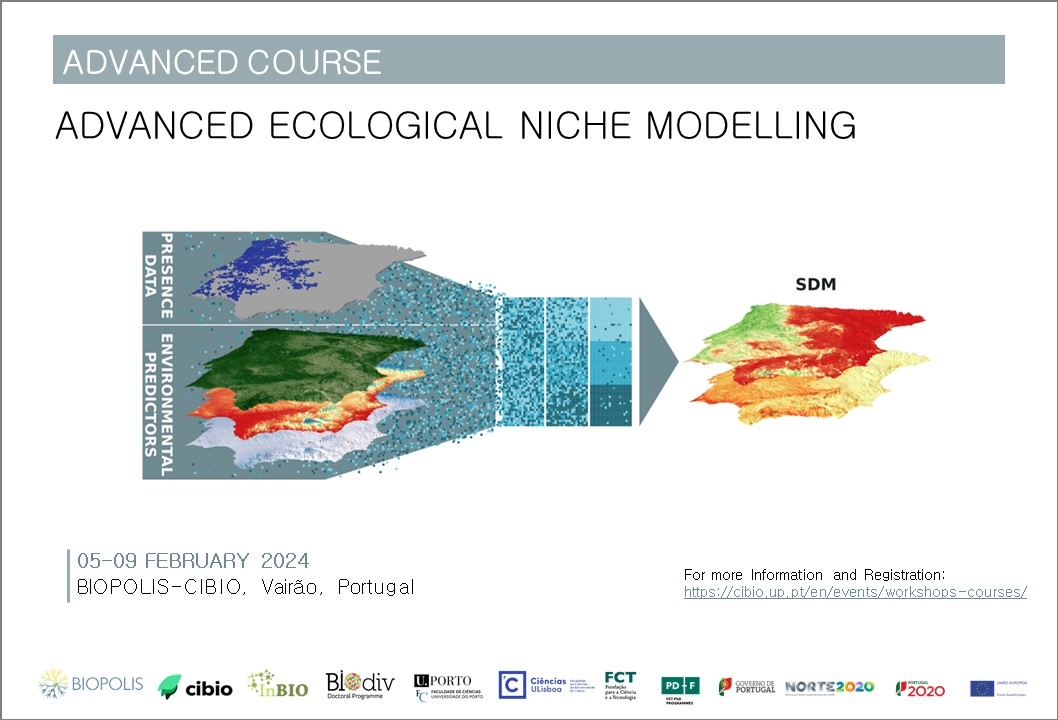Advanced Ecological Niche Modelling
Event
5 - 9 February 2024
Ecological niche models (ENM), and/or species distribution models (SDM), are a series of computer algorithms designed to predict the distribution of species in geographic space based on a mathematical representation of their distribution in the environmental space. This course follows the previous course on "INTRODUCTION TO ECOLOGICAL NICHE MODELLING" and it delves into more advanced aspects of ENM, such as ensemble modelling, niche comparison with null hypothesis testing, and mechanistic models.
PROGRAM (30 hours)
SELECTION CRITERIA
February 05th, 2024
BIOPOLIS-CIBIO, Vairão, Portugal (Face-to-face)

5 - 9 February 2024
Ecological niche models (ENM), and/or species distribution models (SDM), are a series of computer algorithms designed to predict the distribution of species in geographic space based on a mathematical representation of their distribution in the environmental space. This course follows the previous course on "INTRODUCTION TO ECOLOGICAL NICHE MODELLING" and it delves into more advanced aspects of ENM, such as ensemble modelling, niche comparison with null hypothesis testing, and mechanistic models.
Participans should have previously attended the course "INTRODUCTION TO ECOLOGICAL NICHE MODELLING". Alternatively, should have basic knowledge of ENM and be experienced with R coding and spatial data handling.
Day 01 | February 05, 2024
| 9:30-13:00
1.1 Overview of ecological niche modelling
1.2 Ensemble modelling
| 14:00-17:00
1.3 Practice – Import and format data
1.4 Practice – Run models. Example with multimodelling platforms
Day 02 | February 06, 2024
| 9:30-13:00
2.1 Model performance – Diversity of metrics
2.2 Model comparison – Null hypothesis testing
| 14:00-17:00
2.3 Practice – Model performance metrics
2.4 Practice – Niche comparison tests
Day 03 | February 07, 2024
| 9:30-13:00
3.1 Projection in time (past, future)
3.2 Projection in space
| 14:00-17:00
3.3 Practice – model projection
3.4 Practice – dissimilarity surfaces
Day 04 | February 08, 2024
| 9:30-13:00
4.1 Mechanistic and hybrid models
| 14:00-17:00
4.2 Practice – mechanistic / hybrid models
Day 05 | February 09, 2024
| 9:30-13:00
Students' presentations and evaluations. Other topics and questions
COURSE INSTRUCTORS
Fernando Martínez-Freiría (Coordinator) | BIOPOLIS/CIBIO - PHENEVOL
Pedro Tarroso | BIOPOLIS/CIBIO
A. Márcia Barbosa
Urtzi Enríquez Urzelai | Institute of Vertebrate Biology, Czech Academy of Sciences
A. Márcia Barbosa
Urtzi Enríquez Urzelai | Institute of Vertebrate Biology, Czech Academy of Sciences
SELECTION CRITERIA
The course will be open to a maximum number of 20 participants.
75% of available student slots are reserved for BIODIV students.
Priority will be given to:
• 1st year and other PhD students attending the BIODIV Doctoral Program;
• PhD students attending other courses;
• Other post-graduate students and researchers.
REGISTRATION
95€ (students) | 200€ (other participants)
CIBIO-InBIO members will have an additional discount of 20%
Participation is free of charge for BIODIV Students MBGE 1st year Students & CIBIO's TwinLabs
CIBIO-InBIO members will have an additional discount of 20%
Participation is free of charge for BIODIV Students MBGE 1st year Students & CIBIO's TwinLabs
Registration fees do not include accommodation or meals
No ECTS credits are awarded for attending the course. Participants receive a certificate of attendance without quantitative evaluation
No ECTS credits are awarded for attending the course. Participants receive a certificate of attendance without quantitative evaluation
Application deadline: December 15, 2023
To apply, please fill the form available HERE
